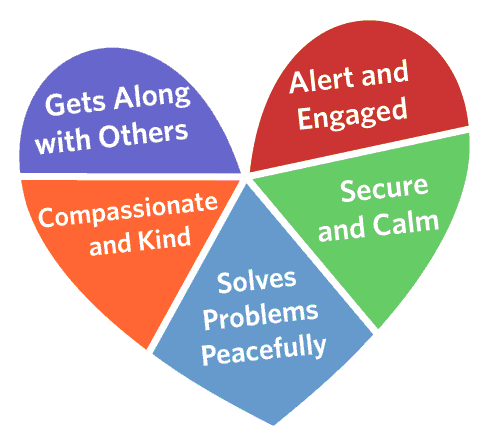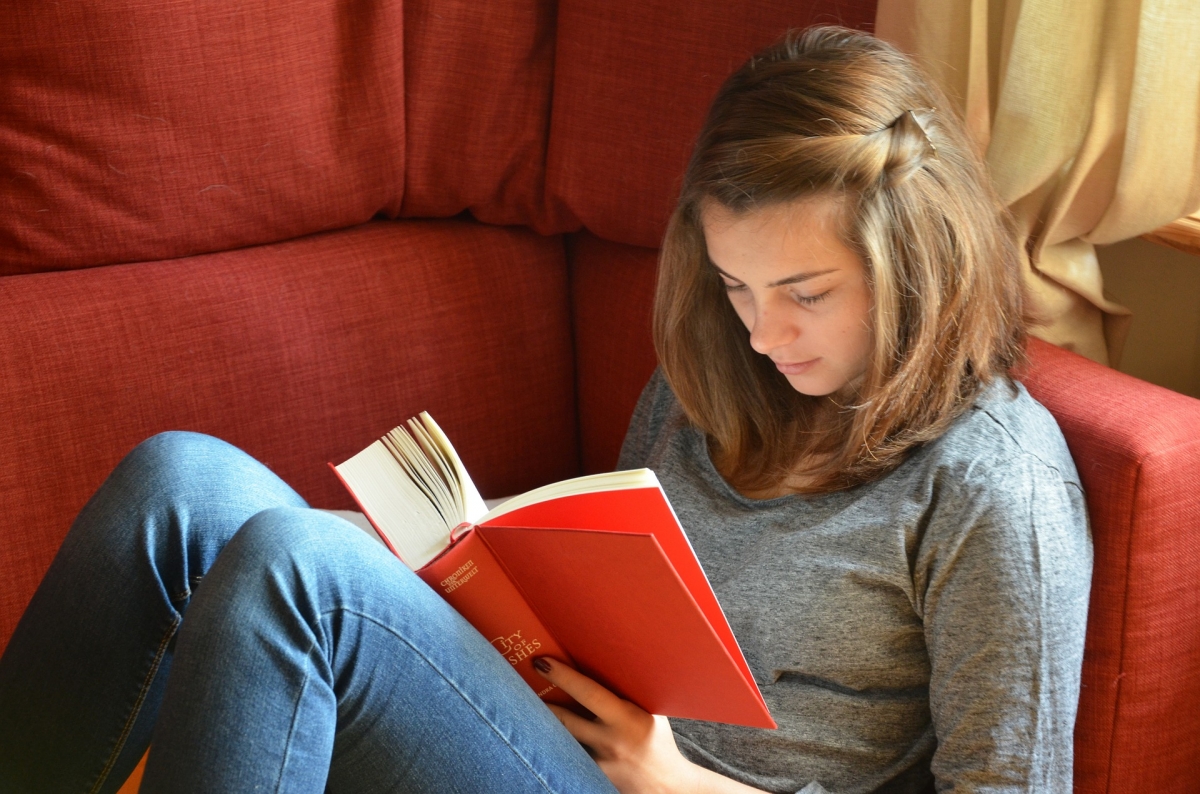
Teaching Heart-Mind well-being to youth (ages 9-13+) can be a lot of fun! This resource proposes 3 engaging, interactive, and entertaining ways to teach the 5 Heart-Mind qualities to youth today!
How to use this resource: Using "Activate Thinking" as a starting point, each activity can serve as a stand-alone exercise in Heart-Mind well-being. Better yet, teach one activity each day, or each week, to deepen students' understanding of the 5 Heart-Mind qualities and strenghten their ability to put them into action.
Activate Thinking: Before launching the activities described below, introduce the youth you care about to the 5 Heart-Mind qualities. A good place to start is with Heart-Mind Well-Being: A Guide for Kids[1]. There are many other helpful resources on Heart-Mind Online.
1. Heart-Mind Improv!
 Invite the class to brainstorm scenarios that they have experienced where a Heart-Mind quality has been absent and write them on the board
Invite the class to brainstorm scenarios that they have experienced where a Heart-Mind quality has been absent and write them on the board- Ask for 2-3 volunteers to come to the front of the class. These students are now "actors"!
- Give the actors a minute (you can use a timer or hour glass for some time-pressure) to choose a scenario[2] in which a Heart-Mind quality is absent, such as one from the board.
- Action! The actors begin acting out their scenario. This is where the fun comes in: at any point, an audience member can yell out "NEW CHOICE!" to make the actors change or completely reverse[3] the last thing that they did or said, on the spot!
- The goal is for the audience to guide the actors, through as many "NEW CHOICES" as necessary, to act out the Heart-Mind quality that was originally missing in their scene. The audience can be more specific if needed, and yell out "NEW RESPONSE," "NEW EMOTION," or "NEW ACTION" etc.
- Each scene should take 3-5 minutes to act out to completion. When the audience is satisfied that the Heart-Mind quality has been enacted, they can shout out "AND SCENE!" to end the scene
- Repeat the game with all 5 Heart-Mind Qualities, with different actors each time!
- The Evidence: Providing opportunities for children and youth to role-play, particularly conflict-resolution scenarios, helps them build important skills to be able to Solve Problems Peacefully.
2. Reader's Theatre
- Break studen
 ts up into groups of 4-5. Assign each group a Heart-Mind quality
ts up into groups of 4-5. Assign each group a Heart-Mind quality - Invite each group to brainstorm situations[5] in which their Heart-Mind quality is used to solve a problem or resolve a conflict.
- Students then select ONE of their situations (they should check-in with the teacher at this step to ensure they are on the right track) to turn into a reader's theater script[6].
- Students write the script together and rehearse it in preparation for a performance. Each group member should have a speaking role, and some may have more than one role (eg. one student can play two smaller parts). Each group should have at least one narrator.
- Students perform their scripts[7] for an audience! The audience can be the class, a buddy class, or a younger grade. This is an excellent opportunity for learning Heart-Mind well-being in a multi-age group, and mentoring younger students in the 5 Heart-Mind Qualities.
- The Evidence: Writing, rehearsing, and performing reader's theatre scripts can build skills important skills that require being Alert and Engaged.
3. Current Events Investigation
- Students can do
 this activity individually or in pairs.
this activity individually or in pairs. - Assign each student or pair a Heart-Mind Quality.
- Invite students/pairs to use computers, tablets, phones, or newspapers to identify a current event/news event that features their Heart-Mind Quality. The focus is on how this Heart-Mind Quality is put into action in a positive way on a scale larger than ourselves.
- Direct students to write up their event in one page or less using the following prompts:
- What happened?
- When and where did it happen?
- How did your Heart-Mind quality come into play in this event?
- In what way(s) did your Heart-Mind quality benefit the situation?
- How can learning about this event help us strengthen this Heart-Mind quality in our lives, schools, and communities?
- Students then present their write-ups to the class or in small groups
- The Evidence: Looking for the good in our world - and linking it to Heart-Mind Qualities that we can practice in our daily lives - can help youth be more Secure and Calm.
While this guide is geared towards younger children, starting simple when introducing a new concept, particularly one with some complexity, is never a bad idea!
Introduce the youth you care about to this guide using the suggestions provided (click "more" below). Then, lead the discussion towards a more mature level by bringing in real-life examples that incorporate more nuance and complexity.
Tips on supporting youth in creating their own reader's theatre script can be found here!
Traditional reader's theatre performances include the performers sitting on chairs or stools in a row, and reading their scripts to the class using expression, tone of voice, volume etc to convey the meaning. Costumes and props are not required.
Students may choose to perform their scripts "skit" style as well, which may include costumes, props, and movement.
Tips on reading for reader's theatre can be found here.
For example:
A mother puts dinner down in front of her child.
Child: "Are you sure you cooked this lobster, Mom? It looks a little undercooked. Is it starting to move? IS IT? AHHHH IT GOT ME MOM IT GOT ME HELP!!!"
Audience: "NEW CHOICE"
Child: "Wait - you made lobster, Mom? LOBSTER? DON'T YOU REMEMBER I'M ALLERGIC... GASP....GASP!"
Audience: "NEW CHOICE"
Child: "I just love how you're working your way through Julia Child's cookbook, Mom! This lobster smells better than Thanksgiving!"
Encourage students to be creative! The situation can be inspired by a book or movie, take place in a distant time/place or fantasy land, include talking animals/objects, mimic reality TV, or be grounded in real-life events.The sky is the limit!
Children and youth are more likely to use positive conflict resolution strategies, like negotiation, during role-play than in real life. In their daily lives, they more often use less-beneficial strategies like coercion. Through practice and as adolescents mature, the use of positive conflict-resolution strategies such as negotiation becomes more consistent across role-play and real life scenarios.
According to research on curriculum-based reader's theatre (in this case, the "curriculum" is the 5 Heart-Mind Qualities), writing, reading, and rehearsing reader's theatre scripts encourages students to read fluently and retain information, increasing the likelihood that students will perform better on assessments.
According to a 2018 study on youth in the United States by the American Psychological Association, over half of the youth surveyed felt stressed - or significantly stressed - about current events such as mass and school shootings, the political climate, the rise in suicide rates, climate change and global warming, and about the separation and deportation of immigrant and migrant families.
Research shows that focusing on the good in the world can help us overcome our negativity bias - our predisposition to focus on and magnify negative happenings - and feel more at ease with how things are.
The scenario should be one scene only, and take place in only one location eg. a classroom, the beach, a dinner table, mars, etc.